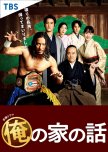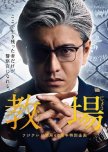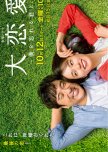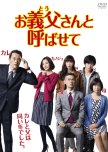
I have got nothing but "splendid" to say about "Ore no Ie no Hanashi".
Well, not really nothing (just quoting Juichi), I have got lots to say about this dorama and will try my best to not include spoilers.Kudo sensei said in an interview that he wanted to make a story about inheritance issues in Japanese traditional art families. The story synopsis may not sound that spectacular. In fact, you might even expect it to be kind of light-hearted, comedic dorama, considering that it's Kudo x Nagase dorama but "Ore Ie" is a lot more than that. Personally, I think the whole COVID-19 thing also somehow influenced Kudo-san's writing too (I'll just stop here to avoid spoilers but those who completed may probably sense the same).
As you ride alongside the Miyama family, you begin to notice that "Ore Ie" is quite different, unique among Kudo's works. I really learned to love and embrace all the good and bad things of the characters. From what I have observed, it is not exaggerated in profiling Ju Ju's character since several renowned traditional arts performer do have more or less similar lifestyle as Ju Ju. After all, even the "Living National Treasure" is still a human being who is as flawed as me or you (well, maybe more than most of us). The whole story subtly portrayed what and why family matters to each and everyone of us, by highlighting many things that we may not think of, forgot or taken for granted and failed to prepare ourselves for our own families when the thing(s) that matter comes (i.e., parents' health and well-being; finding and giving what is best for your children; inheritance, etc.).
On acting, I could not ask for more from the whole cast for the effort they put in. Of all the cast, only Nishida Toshiyuki had a formal training of Noh in the early years of his career (that's why the way he sings is so composed) by an acclaimed Noh actor, Kanze Hisao, who was an influential figure in renaissance of Noh in post-war Japan. He was dubbed as "Zeami of Showa", so in a way, many elements of this dorama also serve as a tribute to him.
Of course, Nagase Tomoya is the one who deserves the most of the credit, applauds for his preparation and performance for mastering all these things about pro-wrestling and Noh. Personally, I recognized Nagase san as a good actor (esp. in comedic roles) though not really was a big fan of him, but his portrayal of Juichi did elevate my opinion of him. Nishida Toshiyuki, Kiritani Kenta, Eguchi Noriko, Nagayama Kento, and the queen, Toda Erika, all delivered what is expected of, with a great chemistry between them. The child actor who played as Hideo also deserves a special mention like all other big names in this dorama.
Here is a brief take on music and re-watch value. Since, the story is about the family and the way it is made, you can always enjoy the story while learning a thing or two from re-watch. OST is not quite standout though I really love the tunes used for some heavy moments (Track no. 3 and 18 from OST). Oh, and Takessy's songs from episode 6 are also entertaining.
"Guilt; Gratitude; Grandeur" is the three words that best describe the theme of this dorama. Being Kudo san's latest work with his usual staff and cast alone is a huge attraction to their longtime fans. Another plus thing is that this dorama, in a way is a tribute to Nagase Tomoya on his journey with TOKIO and Johnny's (a must watch for his fans, as my friend "Coriander" commented). I would not say "Ore Ie" as a go-to dorama for someone new to Japanese culture, but it is definitely a must watch if you are a massive fan of Kudo x Nagase or love a good story about a family.
Esta resenha foi útil para você?

Being a school (or an academy) drama imposes certain limitations and patterns on storytelling, still, it was a great watch.
I set the rewatch value low due to some thriller and investigative elements.
What I appreciate the most in this TV special is the production part. The portrayal of a police academy is concise (possibly as a good PR project from Kanagawa police).
Music/OST is not that standout (typical of one-off TV specials). Ending theme is a good piece though.
Summing up, being 2 parts TV special will take more time to complete, but you will enjoy a different kind of police-theme dorama with a decent cast.
Esta resenha foi útil para você?

The story circle around three "Yutori Generation" lads - Sakama Masakazu, and his friends, Yamaji and Maribu. The story and characters represent the issues, problems faced by the Yutori generations (who are now in late 20s), whether in family, at work or socially. Quarter-life crisis, if you like to label it, but the dorama covered a lot more than that. While some aspects of the dorama may seems too specific towards Japanese society, but if you really look at it, issues like generation gap, stereotypical views and self-esteem on oneself, etc. , can be found in any society or any individual. All of those issues are expressed in a funny, interesting way through the growing friendship of 3 main lead characters.
Regarding to the cast, this is my first time watching Yagira Yuuya and he was impressive. Masaki too, he made a good match with Ando Sakura and two other Yutori guys. I would say Tori Matsu's performance as Yamaji is the most outstanding. Yoshida Kotaro also had a great match with the three Yutori lads as rental ossan.
Insert songs are made up of Kankaku Pierrot's songs. The band did the opening for Black Clover anime, and I would say they perfectly matched the story and scenarios with their songs.
Probably not the one among most popular and iconic dramas. But for me personally, this is one among my all time favorite J dorama since it really reflects the things happening in my life too. Enjoy the show!
Esta resenha foi útil para você?

Dai Renai - Boku wo Wasureru Kimi to
4 pessoas acharam esta resenha útil
I get to see the turbulence in a daily life and life-decisions of an Alzheimer patient, how people who love her have to cope with this adversity and how they try to comfort and make brings convenience, how they try to be happy for the remaining time. Not all the people around you treat the same after the diagnosis even though they know it’s just an unfortunate thing and not even happening them. Most beautiful and the saddest of all, this dorama gives an insight that how the patients have to mentally cope from the sudden changes of their life – family, social, health, career. Dai Renai makes me wonder that what if such tragedy hits to you and your family, precious ones.
Acting-wise, Toda chan (Nao) and Muro Tsuyoshi (Shinji) have the perfect chemistry, enduring and filling for each other’s shortcomings towards their tragic ending. Supporting actors Matsuoka Masahiro (Yuuichi) and Koike Teppei also did perfect job. The ending theme, backnumber's "Old Fashion" is the perfect piece to describe Nao and Shinji's relationship.
Prepare a box of tissue papers should you've decided to watch this, even if it's your second time re-watching.
Esta resenha foi útil para você?

Story-wise, this is not the kind with breathtaking twists and turns, rather calm and steadily paced. I have high hopes since it's based on Higashino Keigo's work. If you are a fan of Higashino Keigo, you will understand that this is simply not at the level of Suspect X (from Galileo series), Sleeping Forest and The Crimes that Bind (from Shinzanmono series). You could argue that those movies have stronger plots since they have their own specialized novels and dramas but I expected more since such great assembly of talents do not come up often in the Japanese movies.
An entertaining movie, but not the one that would give you lingering thoughts after watching it.
Esta resenha foi útil para você?

Veteran Actors Rock!
What's written in synopsis sounds like this is a silly comedy dorama, but it's definitely not.Obviously this dorama is made to be funny, but the best part of this is that those comedic elements comes in a way that you wouldn't expect. At the same time the family (and some workplace, social) issues and how these can be solved are presented subtly. As you watch along, you'll understand and the manners and behaviors of Hanazawa family members and how their engagement with Daidoji has changed them.
Casting is just perfect fit. The chemistry between Daidoji and Hanazawa is just superb, and only those veteran actors can achieve such thing. Wakui Emi is as elegant as ever, and Renbutsu Misako's acting is also laudable, given that her character lies inbetween two veteran actors.
I would say rewatch value is quite high, mainly because of the comedic elements.
Daidoji-Hanazawa chemistry is the key selling point, but the story is not just about them. Light-hearted and funny, yet not cheesy nor silly. It's worth to give it a go.
Esta resenha foi útil para você?

An Extraordinary, Timeless Masterpiece
Magnificent story complemented by Karawasa's top class acting. I knew that this is going to be one hell of a run at 21 episodes (with episode 11 lasting 1.5 hrs), and being a big fan of Yamazaki Toyoko sensei, it really was worth giving time to enjoy this. Yamazaki sensei was renowned for her excellence in portraying power struggles, tragedy of war and moral issues, hence this dorama (novel) was definitely made to be different from typical medical themed works. So, don't expect to see happy things much in this dorama and her other works.I've watched other adaptations of her other best-selling novels - Karei naru Ichizoku(2007) and Fumo Chitai (2009) which are also glamorous projects, but this "Shiroi Kyoto" sits atop of those two. I will just focus on the theme and elements of the story.
Desire, ambition, hierarchy, power, prestige, justice, ethics, morality, empathy, loyalty, betrayal, losing face, etc.,
all those emotions and objects that we humans thrive for and struggle to draw the lines from time to time, are all portrayed superbly fitting in every character and scenario. I would even say that Shiroi Kyoto should be shown in classrooms as a case study for Maslow's hierarchy of needs - that's how great this dorama is!
On acting, at some points, certain acts could be seen over the top (in particular, the wives in the Rose club), but given how the story and characters were designed, it was just fit (for Japanese society, probably it's the same in many other Asian cultures).
I've watched many of Karasawa Toshiaki's works, from comedic "The Last Cop" to "Fumo Chitai" (another adaptation of Yamazaki Toyoko) and IMO, this is his masterpiece. Eguchi Yosuke as Dr. Satomi is also a right fit as an idealistic character whose existence may be hard to find in real world. While the main characters are at the extreme opposite ends of personality and values, characters like Prof. Azuma (Ishizaka Koji) and Dr. Yanagihara (Ito Hideaki) lies somewhat between that spectrum, and complement the story. Also the supporting actors did the perfect jobs to their characters.
Ending theme "Amazing Grace" serves as reflection of the lives of Dr. Zaizen and Dr. Satomi. I also feel that the song is telling Dr. Zaizen to be "Magnanimous in victory, gracious in defeat". OST was composed by Kako Takashi, a renowned Jazz pianist and composer. The tunes were really synced to the characters and scenes.
Rewatch value? Obviously very high.
I would say you don't even need to rewatch to remember, the story and characters will always stick to our memory if you really enjoy. But I think "Shiroi Kyoto" should really be rewatched once with your beloved ones in case if your first watch was alone. Let your beloved ones also enjoy the magnificence of the story, characters and actors as most of the screen entertainment these days cannot offer what "Shiroi Kyoto" can.
Esta resenha foi útil para você?

IMO, this could have been better and taken different directions (or even a sequel) if there wasn't the announcement on scandal of Higashide while the series was airing.
Esta resenha foi útil para você?

This is not a typical war movie filled with battle scene actions or tactical and strategical insights, but it gives you thrilling feeling no less than those movies. To compare it, this movie is a war drama like "Darkest Hour" - incidentally, both countries were in the national emergency (though timing were different), bringing the firefighters to form new cabinet and overcome the situation.
Regarding the story, in the interview with Japan Times, the director stated that he did as much as he can to stay true to the original book than the previous one, and this is believable. Possibly the main difference between the previous adaptation and this remake is the role of the Emperor. Note that Emperor Showa was still reigning in 1967 (so were several personnel involved in Suzuki cabinet and Kyujo incident), and hence to avoid controversies, the Emperor character was given less screen time, even crediting as special appearance. It is a story from Japanese perspective (but I grantee it is not biased), after-all it is all about internal struggles and situations inside wartime Japanese government.
The names like Yakusho Koji, Tsutsumi Shinichi, Motoki Masahiro and Yamazaki Tsutomu (Departures cast), always deliver the best of them. Matsuzaka Tori is also perfect fit as a young, aggressive officer with war-time (propaganda-influenced) mentality. Rivalry between Army and Navy, factionalism inside army, mindset and thinking of military personnel, intensity and tumultuous situation of the period are superbly portrayed by all the characters. The more you delve into history, the more you appreciate the acting and storytelling of this movie.
The movie may not fit for an average viewer (especially for those who do not know or have no interest in WW2 and Japanese history, or at least background situations), but this is a true gem for history geeks.
Esta resenha foi útil para você?

The whole idea behind the plot is somewhat fictional . The way the story is tell is quite similar to Eien no Zero and that makes it more interesting to watch. Both leading characters, Fukamachi (Okada) and Habu (Abe) are strong and passionate personalities and portrayed perfectly. Since it's about Everest, some traditional elements were found in the music, making it different but did not give me significant liking to it.
Overall, it is a good movie and provides a glimpse towards the passion and ambitions of mountaineers.
Esta resenha foi útil para você?

























